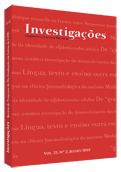O Espaço para a Prática de Reflexão sobre a Linguagem em Teorias de Gênero norte-americanas
Abstract
Este ensaio pretende contribuir para a discussão sobre ensino de língua centrado no gênero, oficializado nos documentos nacionais sobre ensino de Língua Portuguesa. Para isso, são apresentados, no contínuo das teorias de gênero, alguns instrumentos conceituais e analíticos, desenvolvidos nas duas últimas décadas por teorias norte-americanas, de inspiração retórica e antropológica. Na correlação teoria/prática, são apontados, a partir de referências a resultados de estudos aplicados, alguns desafios e princípios a serem observados no ensino orientado por teorias de gênero, com destaque para a pedagogia da consciência de gênero.References
BAWARSHI, Anis S. 2003. The genre function. In: Genre and the invention of the writer. Utah University Press, pp.17-46.
BAZERMAN, Charles. 2005[2004]. Atos de fala, gêneros textuais e sistemas de atividades: como os textos organizam atividades e pessoas. In: Gêneros textuais, tipificação e interação social. Angela Paiva Dionísio e Judith Chambliss Hoffnagel (Orgs.). São Paulo: Cortez, p. 42-91.
______. 2005[2002]). Gênero e identidade: cidadania na era da internet e na era do capitalismo global. In: Angela Paiva Dionísio e Judith Chambliss Hoffnagel (Orgs.). Gêneros textuais, tipificação e interação. São Paulo: Cortez, pp.101-130.
______. 2006[1997]. A vida do gênero, a vida da sala de aula. In: Angela Paiva Dionísio e Judith Chambliss Hoffnagel (Orgs). Gênero, agência e escrita. São Paulo: Cortez, pp.23-35.
BAZERMAN, Charles e PRIOR, Paul. 2007[2005]. A participação em mundos socioletrados emergentes: gênero, disciplinaridade, interdisciplinaridade. In: BAZERMAN, Charles. Escrita, gênero e interação social. Judith Chambliss Hoffnagel e Angela Paiva Dionísio (Orgs.) São Paulo: Cortez, pp.150-190.
BRASIL/SEF. 1998. Parâmetros Curriculares Nacionais do Ensino Fundamental. Brasília: MEC/SEF.
BRASIL/SEMTEC. 2006. Orientações Curriculares Nacionais para o Ensino Médio. Brasília: MEC/SEMTEC.
DEAN, Deborah. 2008. Genre theory: teaching, writing, and being. Urban, Illinois: National Council of Teachers of English.
DEVITT, Amy. 2004. Writing genres. Southern Illinois University, USA.
______. 2009. Teaching Critical Genre Awareness. In: BAZERMAN, C; BONINI, A; FIGUEIREDO, D. (Orgs.). Genre in a Changing World. The WAC Clearinghouse. Fort Collins, www.colostate.edu. Collins.
FREEDMAN, Aviva & MEDWAY, Peter (Orgs.). 1994. Genre and the New Rhetoric. London: Taylor & Francis.
MILLER, Carolyn. 2009. Gênero textual, agência e tecnologia. Angela Paiva Dionísio e Judith Chambliss Hoffnagel (Orgs). Recife: EDUFPE.
PARÉ, Anthony and SMART, Graham. 1994. Observing genres in action: towards a research methodology. In: FREEDMAN, Aviva & MEDWAY, Peter (Orgs.). Genre and the New Rhetoric. London: Taylor & Francis, pp.146-154.
Downloads
Published
How to Cite
Issue
Section
License
Copyright (c) 2010 Maria Augusta Gonçalves de Macedo Reinaldo

This work is licensed under a Creative Commons Attribution 4.0 International License.
Authors who publish with Revista Investigações agree to the following terms:
Authors retain copyright and grant the journal right of first publication with the work simultaneously licensed under the Creative Commons Attribution 4.0 International (CC BY 4.0) license that allows others to share the work with an acknowledgement of the work's authorship and initial publication in this journal.
Authors are able to enter into separate, additional contractual arrangements for the non-exclusive distribution of the journal's published version of the work (e.g., post it to an institutional repository or publish it in a book), with an acknowledgement of its initial publication in this journal.
You are free to:
Share — copy and redistribute the material in any medium or format for any purpose, even commercially.
Adapt — remix, transform, and build upon the material for any purpose, even commercially.
The licensor cannot revoke these freedoms as long as you follow the license terms.
Under the following terms:
Attribution — You must give appropriate credit , provide a link to the license, and indicate if changes were made . You may do so in any reasonable manner, but not in any way that suggests the licensor endorses you or your use.
No additional restrictions — You may not apply legal terms or technological measures that legally restrict others from doing anything the license permits.

